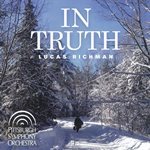|
Back
11/01/2015
“In Truth”
Lucas Richman: Concerto for Piano and Orchestra: In Truth – Concerto for Oboe and Orchestra: The Clearing – Three Pieces for Cello and Orchestra
Jeffrey Biegel (Piano), Cynthia Koledo DeAlmeida (Oboe), Inbal Segev (Cello), Pittsburgh Symphony Orchestra, Lucas Richman (Conductor)
Live Recording: Heinz Hall for the Performing Arts, Pittsburgh, Pennsylvania (February 12, 2015) – 62’43
Albany Records #TROY1583 – Booklet in English

   
The program notes for this CD discuss in detail the origins for the three works by Lucas Richman being performed: the Concerto for Piano and Orchestra “places one’s inner honesty and faith in front of a musical mirror”; the Concerto for Oboe and Orchestra derives from Psalm 23 and portrays an epiphany reflected in musical terms, and the Three Pieces for Cello and Orchestra derive variously from the Sh’ma Yisrael, an additional prayer and finally a folk dance derived from the prayer.
While this sounds exotic and potentially interesting, Richman’s music, alas, is almost embarrassingly derivative of early and mid-twentieth century neo-Romantic music – everything from Richard Addinsell’s Warsaw Concerto (originally composed for a World War II movie, Dangerous Moonlight and modelled on Rachmaninoff), smatterings of Gershwin and Bernstein and even hints of Alex North, best known for film scores ranging from A Streetcar Named Desire to Cleopatra.
Indeed, the first movement of Richman’s Concerto for Piano and Orchestra is almost paraphrased from the Warsaw Concerto with it’s opening chordal motif, then slow lyrical second subject which is nearly an inversion of that for the Addinsell work. Fortunately, the performance by American pianist Jeffrey Biegel does a lavishly commendable job of keeping the work alive. One of the last students of Juilliard’s legendary Adele Marcus (herself a student of Josef Lhévinne and Artur Schnabel, and a close friend of Vladimir Horowitz), Biegel is an inspired player and, while best known for traditional Romantic era repertoire, also is no slouch with Bach and with contemporary and recent contemporary music. The long cadenza which opens the second movement of the Concerto is particularly beautiful with consistently gorgeous sound, tremendous dynamic range (more, incidentally, than the Pittsburgh Symphony manages) and phrasing and legato redolent of the best RCA LPs of Arthur Rubinstein and Van Cliburn during their 1960s heyday.
The Concerto for Oboe and Orchestra is pretty much more of the same and again benefits from a fine soloist, Cynthia Koledo DeAlmeida, who particularly shines during the languid middle movement, which builds to a wild dance echoing familiar works of Debussy, Ravel and Stravinsky. I can say “ditto” for the Three Pieces for Cello and Orchestra and a solid performance by Inbal Segev, who brings taut energy to the final movement’s bustling opening theme juxtaposed with a more steady orchestral motif, then further lilting melodies and a decidedly gypsy ambience.
It takes a lot of work to compose music as complex as these three, even if they are ultimately derivative. The Concerto for Piano certainly could work well as a pops concert’s vehicle, or even for a film should Hollywood wish to remake Humoresque, the 1946 classic starring Joan Crawford as a wealthy music lover who falls for her protégé.
The CD was recorded from a live concert and, while the audio overall is pleasing, the engineers have done a better job with the soloists, especially Jeffrey Biegel, than with the orchestra which tends to sound boxy and square. There’s very little sense of Heinz Hall’s reputed fine acoustics and, if further discs are planned, I’d say the engineers need to spend more time with trial recording before a major session takes place.
Charles Pope Jr.
|